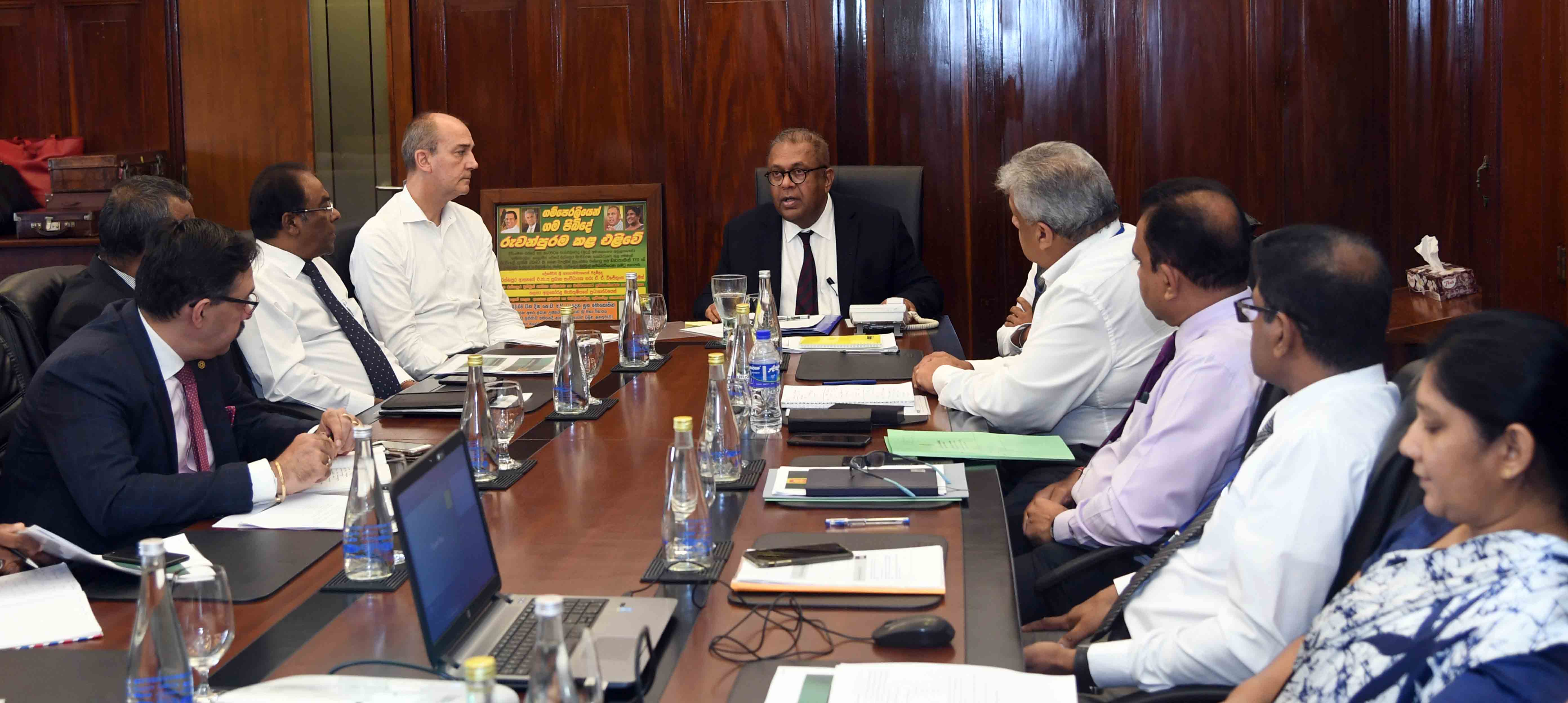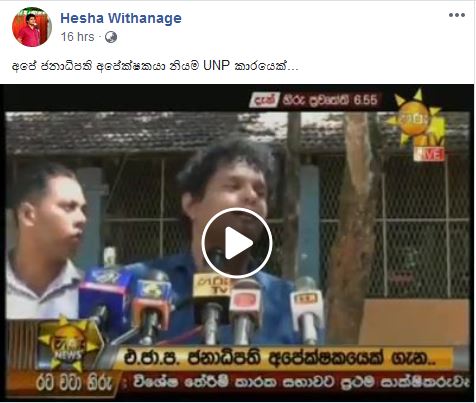News
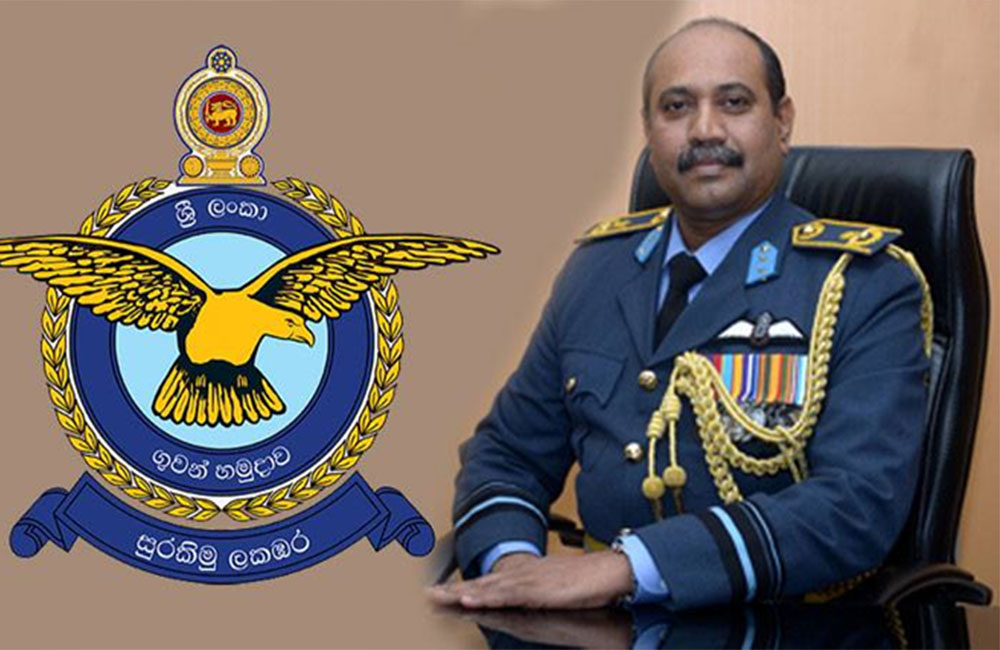
New Air Force commander appointed
A new commander has been appointed to the Sri Lanka Air Force (SLAF), the President’s Media Division said.
Air Vice Marshall Sumangala Dias has been appointed as the new commander of the Sri Lanka Air Force (SLAF) by President Maithripala Sirisena today.
The new Commander received his letter of appointment from the President Maithripala Sirisena this morning (29) at the President’s Official Residence in Colombo.
Meanwhile his predecessor Air Marshal Kapila Jayampathy, who is tipped to retire today, was promoted to the four star rank of Air Chief Marshal with effect from yesterday (28).

Export duty waivers; Sri Lanka submits final papers to EU
Sri Lanka has submitted the final papers to the EU, signed by both the government of Indonesia and the government of Sri Lanka to buy fabric from Indonesia.
This is to secure a complete duty waiver exporting to the European Union (EU) under the GSP + concessions.
The EU has virtually accepted the submission and the Sri Lankan government is waiting for the EU approval to go ahead with this initiative, Nimal Karunathilake- Acting Additional Director General of the Department of Commerce said.
In addition, Sri Lanka has come to final stage of making a joint submission to the EU, signed by the South Korean government and the Sri Lanka government to purchase fabric from Korea.
“Sri Lanka mainly imports fabric from China even though China is not a beneficiary of GSP+ concessions. Now, we’re trying to include both Korea and Indonesia. The work is still going on. The only thing is that it might take few more months and we’re very positive that the EU will grant approval for these two proposals shortly,” Karunathilake told at a seminar held in Colombo last week, under the theme ‘Brexit and its complications to Sri Lanka’.
“Despite the fact the Sri Lankan apparel manufactures continue to purchase fabric at a cheaper price from China, China doesn’t have trade relation for duty concessions with the EU. For this reason, Sri Lanka is unable to fully utilize the full capacity of GSP+ concessions.” Karunathilake said.
Noting that the GSP+ utilization rate is relatively low, which is at 55 per cent, he added that country cannot just depend on the EU, the UK or the USA markets for exports. According to him, industries in China and India will play a major role in the global trade in the years to come. By 2030, China will overcome the USA as the largest economy in the world.
He said therefore Sri Lanka needs to look at these aspects and see whether the country could sign an FTA with China in the near future.
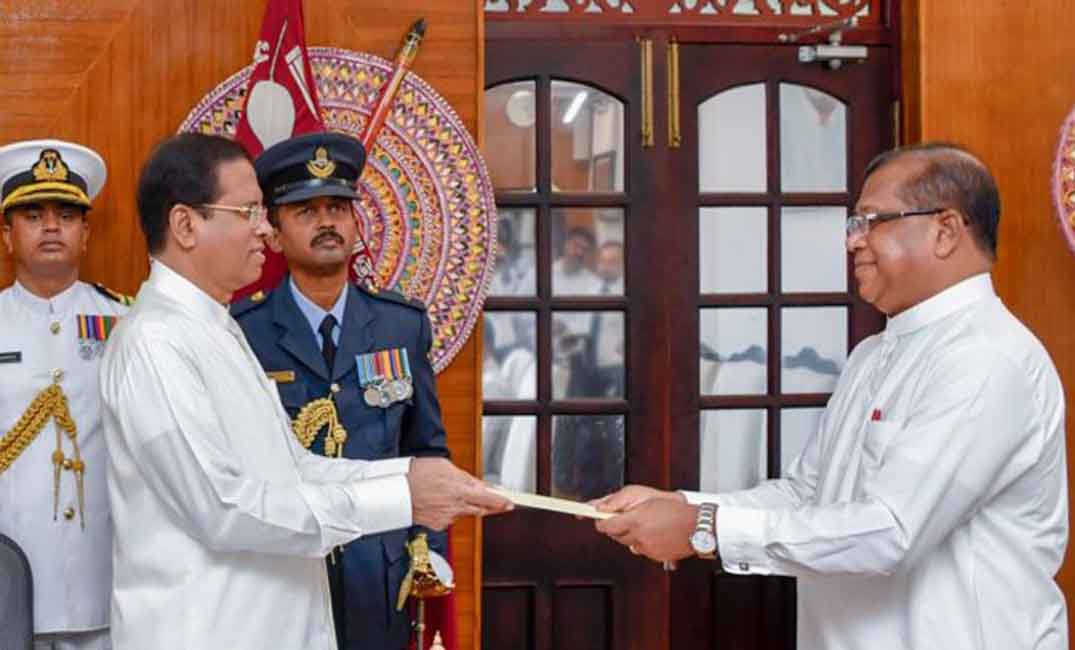
Two new Ministers and a State Minister sworn in
Two Ministers and a State Minister were sworn in before President Maithripala Sirisena today.
Accordingly, Wasantha Senanayake was sworn in as the State Minister of Foreign Affairs.
P. Harrison was sworn in as the Minister of Agriculture, Livestock Development, Irrigation and Fisheries and Aquatic Resources Development.
Meanwhile, Ranjith Madduma Bandara was sworn in as the Minister of Public Administration, Disaster Management and Rural Economic Affairs.
The portfolio of Rural Economic Affairs was removed from the purview of Minister P. Harrison and was brought under Minister Ranjith Madduma Bandara.

Switzerland follows China; relaxes travel advisory on Sri Lanka
Switzerland has relaxed its travel advisory on Sri Lanka after the Sri Lankan government recently assured all resident ambassadors in Colombo about the improved security situation the the country.
Accordingly, the Federal Department of Foreign Affairs (FDFA) of Switzerland has updated its travel advisory on Sri Lanka and advised its citizens to travel to the island nation 'with caution'. Earlier, the FDFA had advised to 'restrict travel' to Sri Lanka unless it was essential.
Meanwhile, China too relaxed its travel advisory on Sri Lanka from 'do not travel' to 'be cautious' last week. Around 260,000 tourists have been visiting Sri Lanka each year since 2016.

Sri Lanka to host the 2021 Annual meeting of the ADB
The 54th Annual Meeting of the Board of Governors of the Asian Development Bank (ADB) is to be held in Colombo, in May 2021, The Finance Ministry said today.
Finance Minister Mangala Samaraweera intimated Sri Lanka's willingness to host the 2021 event in Colombo during the recently concluded ADB Annual Meeting in Fiji.
The Annual Meeting of the ADB Board of Governors provides a platform for member governments to interact with ADB staff, Non-Governmental Organizations (NGOs), and representatives of observer countries, international organizations, and the private sector.
ADB’s Annual Meetings have become a premier forum for the discussion of economic and social development issues in Asia and the Pacific.
Minister Samaraweera held preliminary discussions with Colombo based hoteliers regarding logistical arrangements for the conference as over 3000 delegates from 67 countries are expected to participate at the annual meeting.
Finance Minister Samaraweera discussing logistical arrangements with Colombo based hoteliers at the Treasury.
The decision to hold the 2021 Annual Meeting of the ADB was taken at its 52nd meeting held in Fiji early this month. The next Annual Meeting of the ADB is scheduled to be held in South Korea in 2020.
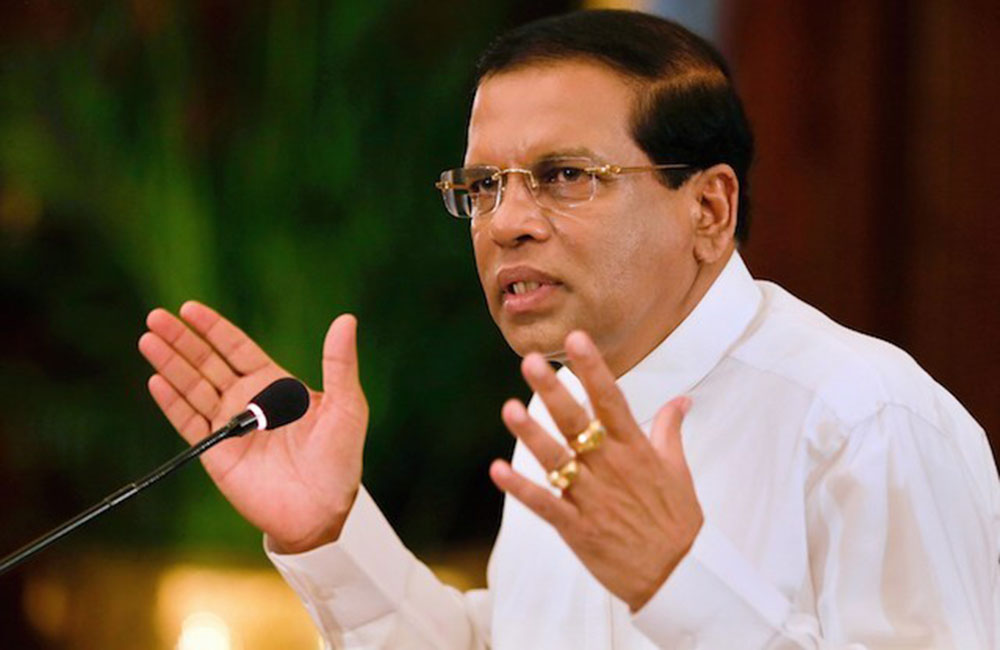
Emergency laws to lapse within a month
President Maithripala Sirisena announced on Monday (27) that he will allow the emergency laws to lapse within a month as the security situation was "99 percent back to normal" following the Easter bombings.
Sirisena told Colombo-based diplomats from Australia, Canada, Japan, the US and European Union that security forces had been successful in arresting all those responsible for the Easter Sunday attacks.
Prime Minister Ranil Wickremesinghe last Friday urged the diplomatic community based in Sri Lanka to take steps to lift the travel advisories imposed on Sri Lanka.
Wickremesinghe made the appeal while briefing diplomats on the security situation in the country following the Easter Sunday attacks.
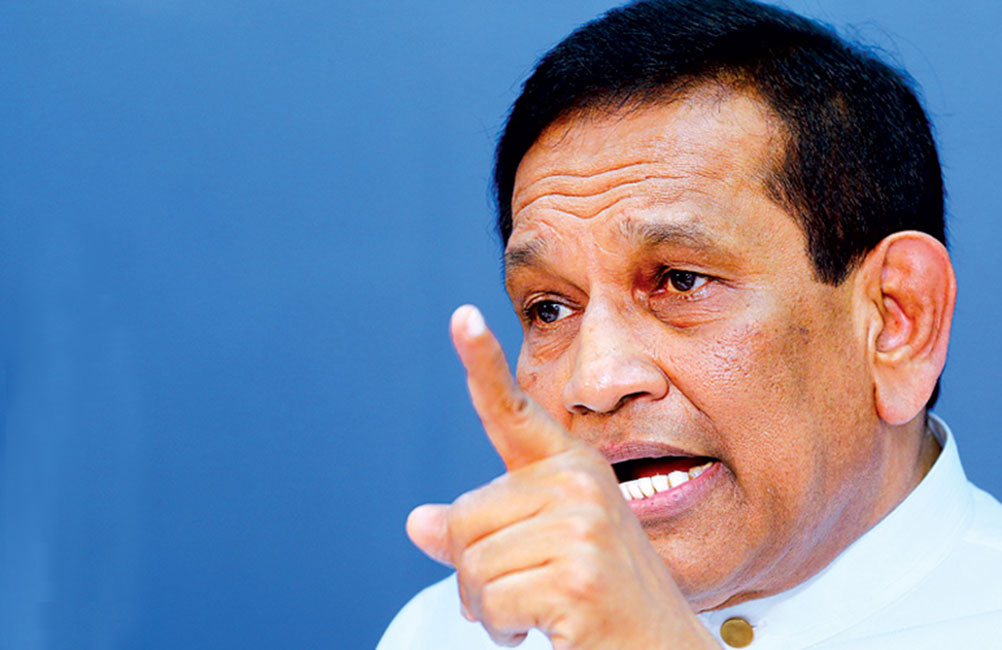
Investigative body to probe allegations against Kurunegala doctor: Rajitha
Health Minister Rajitha Senaratne noted that it was him who had submitted the Cabinet paper to seek approval to allow the controversial doctor, who had tendered his resignation, to return to the Kurunegala Hospital.
A Kurunegala Teaching Hospital doctor was arrested over allegations that he had acquired a large number of assets through suspicious means.
He pointed out that no prior complaints were received regarding the doctor concerned. Senaratne further stated that they will appoint a special investigative body to look into the allegations against the doctor. This committee will be appointed by the Health Ministry, comprising three members of the Ceylon College of Gynaecologists and one member from the Sri Lanka Medical Council (SLMC).
The media would have abstained from giving the same coverage if the arrested person was a Sinhalese surgeon, Senaratne said.
He made these remarks while attending a press conference held at the Temple Tress on Monday.
Speaking on the allegations made against Industry and Commerce Minister Rishard Bathiudeen, Minister Senaratne said that the government has appointed a Parliamentary Select Committee to look into the conduct of Minister Bathiudeen and added that Speaker Karu Jayasuriya will also open their investigations for the general public in order to maintain total transparency.
The Health Minister stated that Bathiudeen had not forced the Army Commander to release the suspects and said that the Army Commander himself had earlier admitted that Bathiudeen had only made a request.
Senaratne underscored that it was the previous regime that nurtured Zahran and his subordinates. He added that it was under former Secretary to the Ministry of Defence, Gotabaya Rajapaksa that the mastermind behind the Easter Sunday attacks Zahran Hashim and 26 others of the National Thowheed Jama'ath were paid, incidentally from the same bank account.
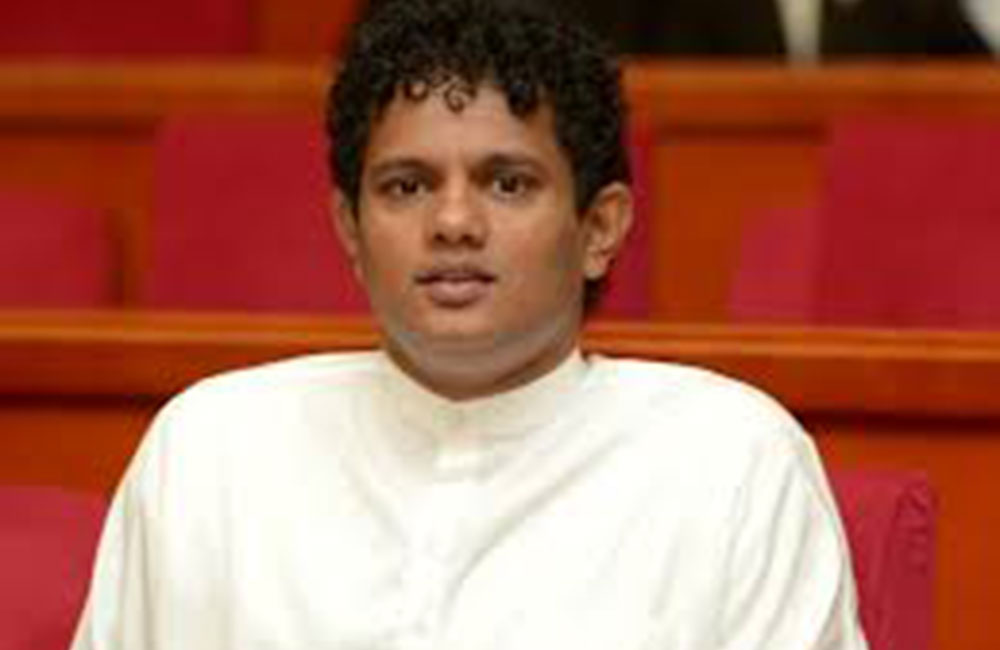
Hesha dismisses common candidate claims
The United National Party will field their very own candidate at the upcoming presidential election, parliamentarian Hesha Withanage said at a meeting in Godakawela.
Sharing his sentiments again on Facebook, the vociferous back bencher reiterated that the UNP will not be fielding anyone outside the party and that they will only consider an original UNPer to be its candidate. He further stated that they don't need to import a leader and stressed that they will not give presidential candidacy to a 'merchant' like Dhammika Perera.
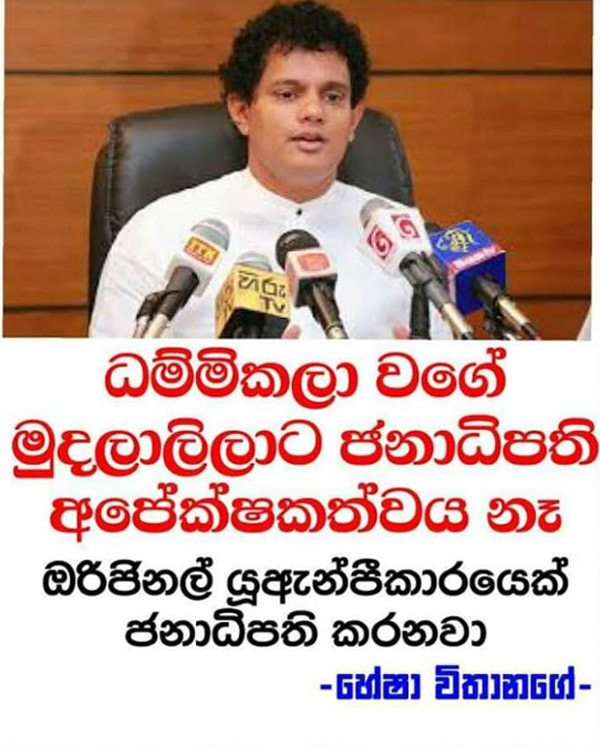 Meanwhile, Minister of Public Administration and Disaster Management, Ranjith Madduma Bandara, at a press briefing in Moneragala yesterday, emphasised that on behalf of all party loyalists, they will only field a candidate from the UNP at the upcoming presidential polls.
Meanwhile, Minister of Public Administration and Disaster Management, Ranjith Madduma Bandara, at a press briefing in Moneragala yesterday, emphasised that on behalf of all party loyalists, they will only field a candidate from the UNP at the upcoming presidential polls.
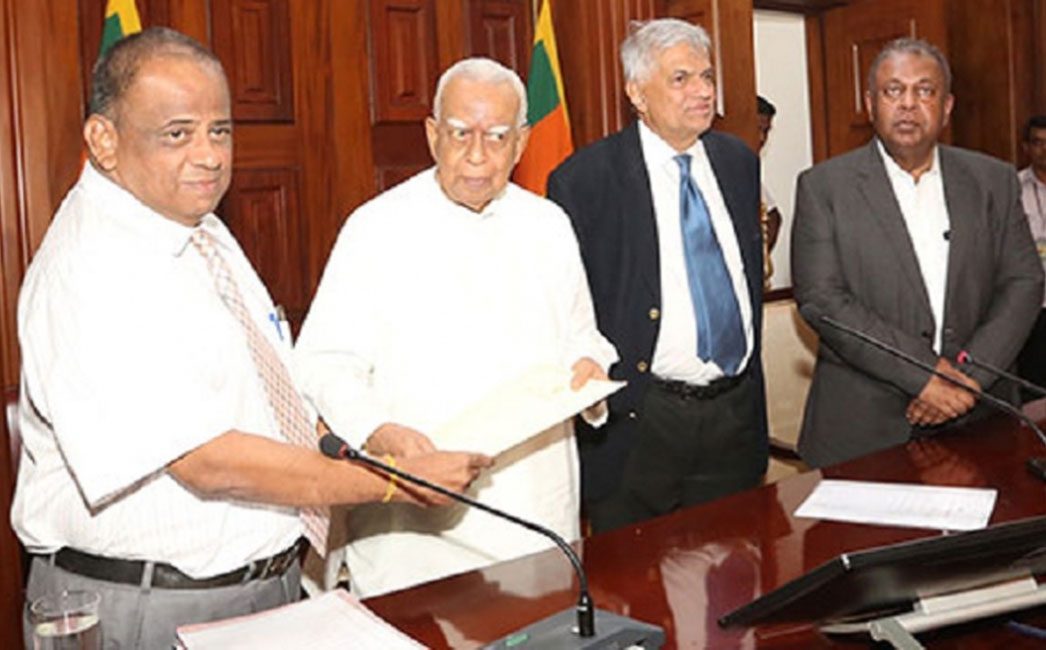
'Palmyra Fund' to accelerate development in North & East launched
Finance Minister Mangala Samaraweera's budget proposal to establish a 'Palmyra Fund' geared towards providing adequate financing for the accelerated development of Eastern and Northern Provinces was launched under the patronage of Prime Minister Ranil Wickremesinghe at the Temple Trees yesterday (27).
The fund was established after considering the requests made by parliamentarians representing the Norther and Eastern provinces, premier Wickremesinghe said.
The fund starts with a seed capital of LKR 2.5 billion while additional funds of LKR 2.5 billion is to be allocated for the fund, the Prime Minister.
In addition to this seed capital, LKR 7 billion of funds will be spent on the North and the East under ‘Gam Peraliya’ rapid rural development programme. According to the Treasury Secretary Dr. R.H.S. Samaratunga, approximately LKR 50 billion will be spent on the North and East this year alone, he said.
Wickremesinghe further said that funds will also be made available under the Enterprise Sri Lanka credit schemes for small-scale businesses to operate in the Northern and Eastern provinces.
“The govt will be giving employment to 22,000 graduates, so there will be a significant portion of them who come from Jaffna. There are other schemes under which employment opportunities will be founded. Funds that are being pumped into the northern and eastern economies will also create employment opportunities there,” the prime minister added.
Minister of Finance Mangala Samaraweera, Leader of Tamil National Alliance R. Sampanthan, Non-Cabinet Minister of Economic Reforms and Public Distribution Dr. Harsha de Silva, State Minister Vijayakala Maheswaran, Parliamentarians Selvam Adaikkalanathan and S. Shritharan also graced the event.
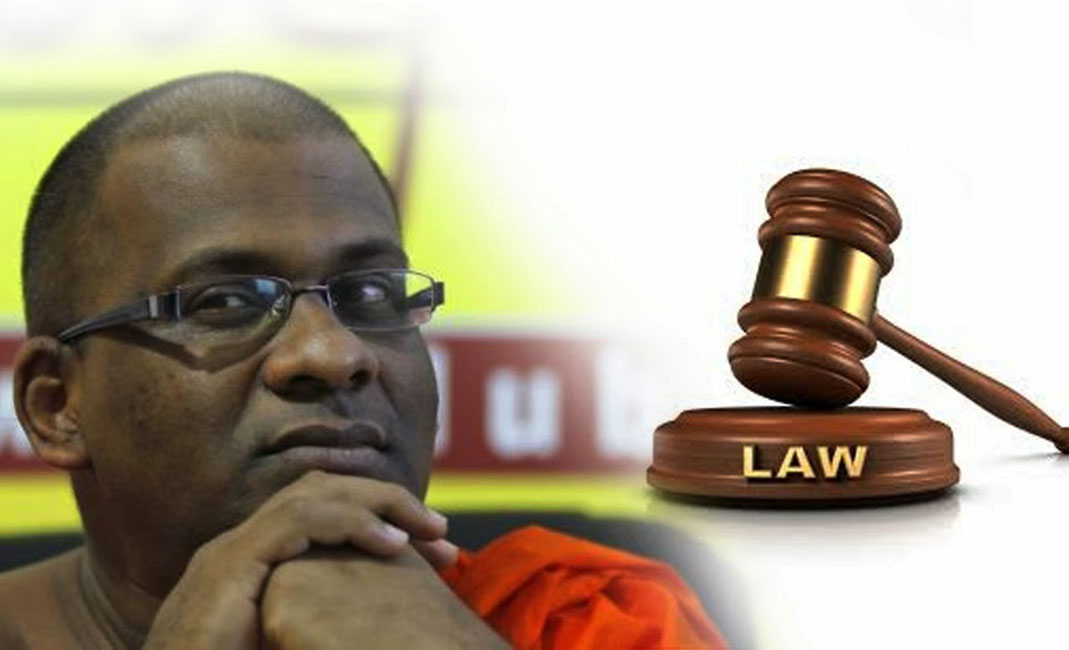
Gnanasara Thero's pardon could legitimise impunity through political considerations
The Centre for Policy Alternatives (CPA) has expressed its deep shock and concern over the Presidential pardon of Galagoda Aththe Gnanasara Thero, who was released from prison on 23rd May 2019. The pardon raises a number of pressing questions which the President and the government are obliged to answer.
Gnanasara Thero was convicted of four contempt of court charges by the Court of Appeal on 8th August 2018 and sentenced to 19 years of rigorous imprisonment to be completed within 6 years. The conviction and sentencing was premised on the Thero’s behaviour within court premises which was judged to have been beyond the respectful behaviour expected of ordinary citizens before the courts.
CPA stressed that presidential pardons exist to correct miscarriages of justice and are to be exercised with extreme caution and gravity. The pardon of Gnanasara Thero cannot be called a fit and proper exercise of that power by any metric. The trial, conviction and sentencing of the Thero raised no legitimate questions of any miscarriage of justice and there was ample opportunity for the Thero to fully exercise his right to a fair trial by appealing his conviction. Indeed this option was pursued by him at both the Court of Appeal and the Supreme Court which both duly dismissed the appeals. As such, the pardon itself amounts to an undue interference with the legal process.
The pardon raises a number of very serious concerns. First, it legitimises the view that it is possible to act with contempt for the judiciary, be punished through a legitimate judicial process, and then enjoy impunity through a pardon granted on political considerations. The pardon specifically signals that some categories of citizens, such as the Buddhist clergy, can expect to enjoy preferential treatment when it comes to obeying the law. It also sets a dangerous precedent whereby properly tried, convicted and sentenced persons can be released on the whims of the President and government.
Second, the pardon comes amidst the ongoing and extremely tense situation in the country. It has been a mere week since extremist Sinhala Buddhist mobs instigated anti-Muslim riots across North Western Sri Lanka, resulting in the death of one Muslim man and the damage to a large number of Muslim residences, businesses and places of worship. Gnanasara Thero has played a documented role in the past as Secretary of the Bodu Bala Sena in expressing hate speech and inciting violence towards minority communities, particularly Muslim Sri Lankans. The pardon, however indirectly, represents a worrying endorsement of such anti-minority sentiment, and can only heighten the anxiety and fear being felt by Muslim Sri Lankans today.
The responsibility for interfering with the rule of law and endorsing anti-minority sentiment in this manner lies not only with the President but the wider government as well. The Minister of Buddha Sasana Gamini Jayawickrama earlier endorsed requests by religious and political third parties to issue the pardon, and numerous members of the government have spoken out and acted in support of it. Accordingly, the government as a whole must justify, with stated reasons, why the grant of a pardon in this case will not be inconsistent with the Constitution, the rule of law, and the administration of justice in Sri Lanka and will not exacerbate inter-communal tensions. Anything less will directly undermine the legitimacy of Sri Lanka’s democracy.
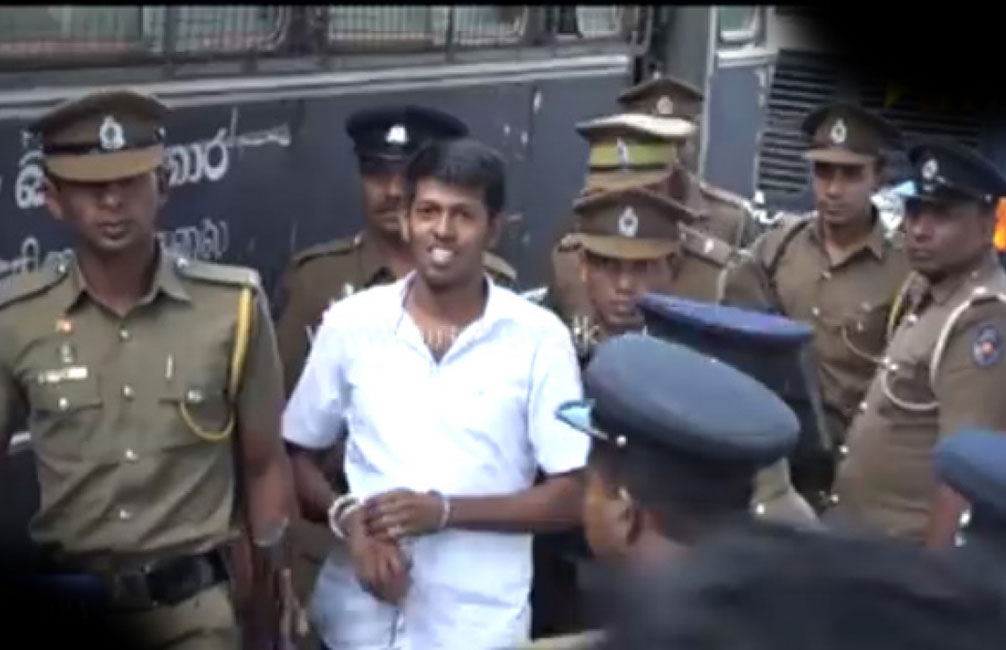
Amith Weerasinghe re-remanded
Leader of 'Mahason Balakaya' Amith Weerasinghe has been further emanded until tomorrow (29) by the Colombo Additional Magistrate.
Weerasinghe was arrested on May 14 in Teldeniya for instigating communal disharmony and religous hatred.
The Police said that Weerasinghe had posted content on the internet which was deemed offensive to religious coexistence.
The Colombo Magistrate's Court instructed the Police Organised Crimes Preventive Division to submit a complete report containing evidence against the accused tomorrow.

Extinct legal system caused security crisis resulting in Easter Sunday carnage
According to Sri Lankan Army Commander Mahesh Senanayake, the present security crisis facing the country was a result of the failures of many government institutions. In a television interview available on YouTube, he cited foreign exchange control failures to monitor money coming into the country, Customs Department failures, and intelligence coordination failures.
Aside from these valid insights, there is a more fundamental failure contributing to all other failures: the virtual extinction of a rule of law based legal system, and the crisis of justice institutions. The destruction of Sri Lanka’s rule of law framework did not occur overnight; it happened gradually over a period of some 40 years.
How did a rule of law based legal system become extinct in Sri Lanka?
The most important cause for this is the development of a system based on principles contrary to rule of law principles. This system was created largely by the 1978 Constitution, which itself is based on such contrary principles:
The 1978 Constitution allows for the virtual taking over of the lawmaking function by the Executive President, thus virtually displacing the role of a dynamic legislative system to debate and adopt laws. In the process of such debates, how the new legislation affects the overall rule of law framework is an important consideration.
Rules relating to the passing of laws and amendments to the Constitution were changed to make it easy for the Executive President to pass legislation suited to him while preventing public debate on such legislation.
By including national security provisions in the Constitution, a conflict is created with the rule of law principle. The inclusion of the national security law into the Constitution made it possible to grant impunity for many crimes.
The Constitution virtually displaced command responsibility in all institutions, making it possible for the Executive President or other parliamentarians to interfere in these institutions. As a result, gradually, the way was paved for politicians and influential persons to use public institutions as they wished. This displaced the rule of law framework for these institutions.
Discretion in deciding on matters of any kind in any institution was widely allowed, thus displacing the basic principle that it is the law that is important in decision-making and that discretion only plays a limited role. This gave rise to all kinds of practices, which would have been considered illegal under the rule of law systems. It also ensured that no monitoring of the institutions was possible, with everyone acting as they wish.
This process made its way into justice institutions as well. The police, for instance, had many varying criteria for acting on crimes, depending on all kinds of extraneous consideration. The same happened to the Attorney General’s department, which for a long time had the reputation of being based on legal considerations only. Within the judiciary, discretion took a more prominent place than the law. This happened in a wild way under Chief Justice Sarath N. Silva, and it has continued thereafter. This was expressed beautifully by late S. L. Gunasekara, Senior Attorney at Law, who wrote that ‘those days we knew what will be the ultimate outcome of a case and that is no longer the case now’. Even the United Nations Human Rights Committee exposed how international norms and standards were violated by some of the judgments of the Supreme Court.
As a result of this displacement of the rule of law system, Sri Lanka lost the ability to distinguish between legality and illegality. Actions are regarded as valid despite being illegal. Many monetary scandals have their base in ignoring rules and laws. Enforced disappearances, widespread corruption, and many other illegal practices have now become part of the local system of law and justice in Sri Lanka.
When a system is so confusing, it is almost impossible for various institutions to coordinate towards achieving a single purpose. For a state, the security of its citizens is the most important single goal that it should pursue. This is not possible however when the total system is not run by uniform principles considered the basic criteria of judging the action.
What matters in security is not what is done after the disaster has already taken place. What really matters is prevention. Working towards prevention is something that is done on a regular basis as daily work. Such prevention is possible only when every one is bound by the same ultimate principles of rule of law.
Thus, transforming today’s insecure situation into secure circumstances cannot merely be done by certain military arrangements, which are made during an emergency. The transformation needs to go beyond such situations, and address causes which broke down the country’s legal and judicial system.
Page 314 of 510
